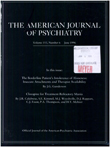The deficit state in first-episode schizophrenia
Abstract
OBJECTIVE: The prevalence, clinical correlates, and outcome of the deficit syndrome were determined for 70 patients ascertained in their first episode of schizophrenia and then followed through their recovery. METHODS: Patients were treated in a standardized manner and underwent baseline assessments of symptoms and adverse effects that were repeated at intervals throughout their inpatient and subsequent outpatient course. Forty-seven patients were followed for a minimum of 6 months after remission of their positive symptoms, allowing for an assessment of their deficit syndrome status. RESULTS: Using modified criteria of Carpenter et al. for the deficit syndrome, the authors found that two patients (4%) met all criteria for the deficit syndrome, nine (19%) had deficit symptoms (questionable deficit state), and 36 (77%) had no deficit symptoms. When patients who had not fully remitted or had remitted for less than 6 months were included, seven (10%) met deficit syndrome criteria, 11 (16%) had deficit symptoms, and 52 (74%) had no deficit symptoms. CONCLUSIONS: The prevalence of the deficit syndrome in first-episode schizophrenia varies depending on the criteria used and is lower than that previously described in more chronic patient samples. Patients without deficit symptoms had better premorbid functioning and a better global outcome than patients with deficit symptoms.
Access content
To read the fulltext, please use one of the options below to sign in or purchase access.- Personal login
- Institutional Login
- Sign in via OpenAthens
- Register for access
-
Please login/register if you wish to pair your device and check access availability.
Not a subscriber?
PsychiatryOnline subscription options offer access to the DSM-5 library, books, journals, CME, and patient resources. This all-in-one virtual library provides psychiatrists and mental health professionals with key resources for diagnosis, treatment, research, and professional development.
Need more help? PsychiatryOnline Customer Service may be reached by emailing [email protected] or by calling 800-368-5777 (in the U.S.) or 703-907-7322 (outside the U.S.).



